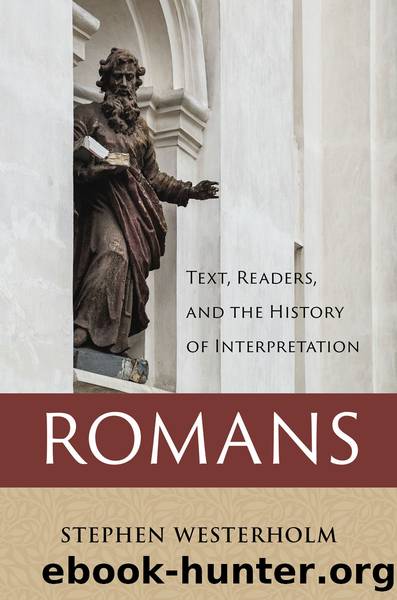Romans by Stephen Westerholm

Author:Stephen Westerholm
Language: eng
Format: epub
Publisher: Wm. B. Eerdmans Publishing Co.
Published: 2022-01-15T00:00:00+00:00
5.3. THE GENEVA BIBLE (1560)
A quarter century after Tyndale last revised his New Testament, the sixteenth century continued to be the best of times for Bible translations, the worst of times for their translators. The Geneva Bible was published in 1560 in Calvinâs Geneva by English scholars who had fled the persecutions of Queen Mary; it reflected the state of the art in textual and linguistic scholarship.73 Its greatest advance lay in that half of the Old Testament left untranslated by William Tyndale at his death: the Geneva Bible contains the first English rendering of those books from the Hebrew text.74 For the New Testament, William Whittingham, a fellow of All Soulsâ College, Oxford, could build upon the pioneering work of Tyndale. But he could also consult the latest Greek text and the numerous translations into other European languages (French, Italian, and Spanish, in addition to Bezaâs Latin translation) published by scholars gathered in Genevaâand the Bibleâs title page indicates that he did: âTranslated according to the Ebrue and Greke, and conferred with the best translations in divers langages.â75
Like Tyndale, the Geneva translators were bent on making the Bible accessible to the uneducated laity; a number of features were designed to further that end. It was in Geneva that the chapters of the Bible were first divided into verses, making practicable the use of concordances and facilitating reference to particular texts. Marginal references to parallel passages are thus more specific in the Geneva Bible than in Tyndaleâs 1534 version; they appear much more frequently as well. A brief phrase summarizing the content was placed at the top of each column of text (each page had two columns): âAll are culpableâ over Romans 3:4â25; âIustificacion by faithâ over 3:26â4:11; âWe must be holieâ over 6:15â7:6; predictably, âPredestinacionâ over 9:17â33. Prologues introduced the content of each book of the Bible, and brief summaries of each chapter were placed at their head.
CHAP. II. 1 He feareth the hypocrites with Gods judgment, 7 And comforteth the faithful. 12 To beat downe all vaine pretence of ignorance, holiness, and of alliance with God, he proueth all men to be sinners, 15 The Gentiles by their conscience, 17 The Iewes by the Law written.
CHAP. III. 1 Having granted some prerogatiue to the Iewes, because of Gods fre and stable promes, 10 He proueth by the Scriptures, bothe Iewes and Gentiles to be sinners, 21. 24 And to be iustified by grace through faith, & not by workes, 31 And so the Law to be established.
CHAP. VI. Because no man shulde glorie in the flesh, but rather seke to subdue it to the Spirit, 3 He sheweth by the vertue & end of Baptisme, 5 That regeneration is ioyned with iustification, and therefore exhorteth to godlie life, 21 Setting before mens eyes the rewarde of sinne and righteousnes.
CHAP. VII. 1.7.12 The use of the Law, 6.24 And how Christ hathe deliuered us from it. 16 The infirmitie of the faithful. 23 The dangerous fight between the flesh and the Spirit.
Download
This site does not store any files on its server. We only index and link to content provided by other sites. Please contact the content providers to delete copyright contents if any and email us, we'll remove relevant links or contents immediately.
The Five People You Meet in Heaven by Mitch Albom(3545)
The Secret Power of Speaking God's Word by Joyce Meyer(3141)
Real Sex by Lauren F. Winner(3000)
Name Book, The: Over 10,000 Names--Their Meanings, Origins, and Spiritual Significance by Astoria Dorothy(2962)
The Holy Spirit by Billy Graham(2932)
0041152001443424520 .pdf by Unknown(2832)
How The Mind Works by Steven Pinker(2801)
ESV Study Bible by Crossway(2768)
Ancient Worlds by Michael Scott(2661)
Churchill by Paul Johnson(2564)
The Meaning of the Library by unknow(2552)
The ESV Study Bible by Crossway Bibles(2543)
The Gnostic Gospels by Pagels Elaine(2515)
MOSES THE EGYPTIAN by Jan Assmann(2406)
Jesus by Paul Johnson(2347)
City of Stairs by Robert Jackson Bennett(2335)
The Complete Dead Sea Scrolls in English (7th Edition) (Penguin Classics) by Geza Vermes(2268)
The Nativity by Geza Vermes(2217)
Ancient Near Eastern Thought and the Old Testament by John H. Walton(2213)
